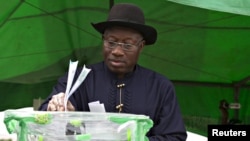Nigeria’s former president Goodluck Jonathan made history by conceding defeat and handing power to his opponent in the March presidential election. Now that he has left office, analysts say Jonathan likely will not live much of a public life, at least in Nigeria.
Hours after the inauguration ceremony for new Nigerian President Muhammadu Buhari, now-former president Goodluck Jonathan was back in Yenagoa, capital of his home state Bayelsa, which he governed before ascending to the vice-presidency and then the presidency itself.
At 57 years old, Jonathan’s future remains unclear. In a speech to supporters welcoming him home, he spoke of handing the reins to others who could build up Nigeria.
“I remain most grateful for all Nigerians. The best I can do now is to dedicate the remaining part of my life to keep building across the country,” said Jonathan.
This year's election was essentially a rematch of the 2011 vote. Around 800 people died in the days after that election, as Buhari disputed his loss to Jonathan.
In the run-up to the March polls, civil society groups had warned violence could happen again.
But this time, Jonathan called Buhari and conceded defeat even before the final result was announced.
Possible honorary role
Jonathan’s grace after losing has prompted commentators to speculate that the international community would reward him somehow. Perhaps he would be a United Nations peace envoy, or be given a similar title by the African Union or West African regional bloc ECOWAS.
Emmanuel Onwubiko, a retired journalist and head of the Human Rights Writers’ Association of Nigeria, says Jonathan likely will not lead much of a public life in Nigeria. His future lies abroad, he says.
“He should be very active in terms of, you know, the promotion of political virtue so to speak, peace-building, conflict management and conflict resolution, on the African continent and at international levels.”
Local media reported that Jonathan turned down a position on the board of trustees of his party, the Peoples Democratic Party, or PDP. Until Jonathan’s defeat, the party had held office in Nigeria since the country returned to democracy in 1999.
As it transitions into being an opposition party for the first time in its history, former PDP party treasurer Bala Ka’oje says the party will look to move beyond Jonathan.
“I think in order for the PDP will revive itself, it has to more or less start, I think, afresh with the right kind of people who can do correct leadership.”
One thing is for sure, Ka’oje says: Jonathan will be nothing like his sole living predecessor, former president Olusegun Obasanjo. Obasanjo was a thorn in Jonathan’s side during his term. Weeks before the election, he publicly renounced his membership in the PDP, a move some analysts say contributed to Jonathan’s defeat.
Hilary Uguru contributed reporting from Yenagoa, Nigeria.
